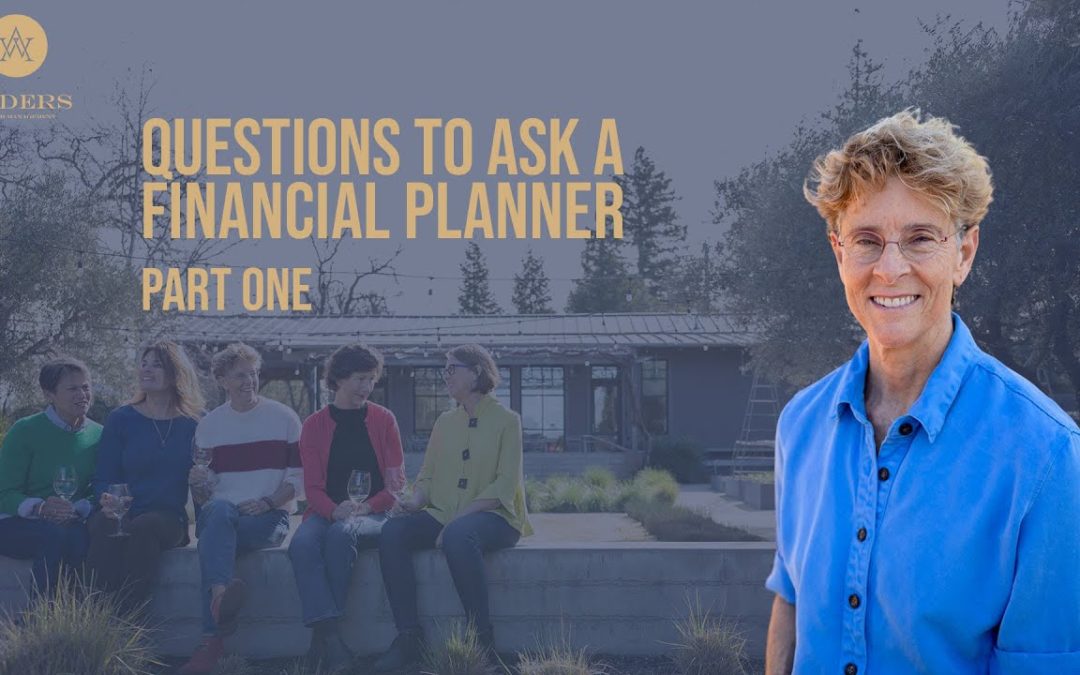
Questions To Ask a Financial Planner – Part One
Hi there and thank you for stopping by today. Today where I am going to talk with you about questions that you might consider asking a potential financial advisor before you sign on with this person. My name is Tina Anders. I am the owner and founder and certified financial planner for Anders Wealth Management located in Petaluma, California serving Sonoma and Marin counties and the greater area.
Today, I am going to talk with you about questions that you might consider asking a potential financial advisor before you sign on with this person.
The first question that I would ask a potential financial adviser is, are you a certified financial planner? And if the answer is yes, that’s great. If the answer is no, find out why. Because a certified financial planner has to take a minimum… well, they have to take 30 continuing education units, excuse me, every two years. Most certified financial planners that I know take well above 30 units per two years because there is so much information out there. And we have to stay abreast of it so that we can advise our clients the best possible way that we can.
Secondly, about a certified financial planner, there are 10 hours of exams to become a certified financial planner that must be passed. And so in order to pass those exams, there’s a lot of knowledge that needs to go in to preparing for the exams.
And thirdly, there’s a there’s an experience element. A certified financial planner needs to have experience in the industry in order to be certified.
So, those are just three good reasons to hire a certified financial planner versus somebody who’s not. Another question that you might ask is, are you fee only? Are you fee based? Do you work for a large brokerage firm? You’ll already know that when you talk to them.
There’s a difference between a fee only financial planner and a fee based financial planner or somebody who’s not fee related or oriented. And there those are these: a fee only advisor has taken a fiduciary oath to advise in your best interest. And so what that means is, she or he will not have any conflicts of interest when it comes to selling you things. To get advice in your best interest, you need somebody to be objective. If I’m getting kickbacks, commissions, incentives of any kind to recommend a certain investment product to you, or a certain insurance product to you. Perhaps and I’m not insinuating that people are not ethical, but perhaps there is in fact a conflict of interest there. Perhaps I will offer you something that could be helpful to you, but may not be the best advice for you, best product for you. And perhaps I’m looking at not only your situation, but my financial situation and thinking, how can we both benefit from my advice versus just you the client who is paying me?
So fee only, no sales, no commissions, no kickbacks. Fee based, yes there’s a fee for usually financial planning, but then there are sales on top of that. Sales in regards to products to invest in or products to buy for insurance purposes, annuities, things of that nature.
And then there are stockbrokers and other people who call themselves, financial advisors, probably conflicts of interest. So, just be aware of the fee only versus fee based versus neither of those and just know what you’re looking at and ask those questions. It’s important that you find out what you’re dealing with, no surprises.
Tune into Part Two for questions to ask a potential financial planner. Thanks again for stopping by, I appreciate you listening in. Comment below with any questions, comments, or if you have any topics you would like me to discuss in the future, I will try to put a video out for you. Thanks again. I am in your corner.
